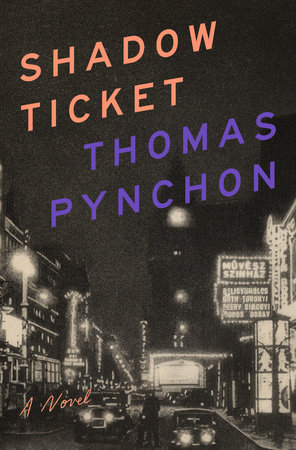The Last Postmodern Novel

Like Gravity’s Rainbow, Shadow Ticket—the latest, and possibly the last book we’ll get from Thomas Pynchon during his lifetime—begins with a bang. At a distance of half a century, this new novel reads like an aftershock, images of fireworks looping on a screen, announcing nothing. It’s tempting to suggest that the fervor around Gravity’s Rainbow was at least partially aided by the superior attention spans of the 20th century. This was Pynchon’s third novel, and his freakish promise was still largely unfulfilled. The book’s self-indulgence would be excused by the eventual proof of its clairvoyance; Pynchon’s defects could be chalked up to raw talent, of which critic James Wood remarked: “It may be that he has too much.” In 2025, Pynchon contends with a culture that has caught up to him.

Shadow Ticket
Thomas Pynchon
Penguin Press, 2025, 304 pages
The plot, such as it is, belongs to a heretofore unexplored genre we might call dairy noir: Hicks McTaggart, a private detective in Wisconsin cheese country is over-worked and under-fed, barely getting through the Great Depression. Having washed up on the shores of Eastern thought via a magazine called “Oriental Attitude,” Hicks is repentant for his violent past as a strikebreaker. Our gumshoe is a “10-minute egg” with a pattern of white-knighting for divorcees who mistake him for “a lawyer that doesn’t charge much, with muscle thrown in for free, leading to romantic outcomes easy to imagine.”
In Shadow Ticket, fascism doesn’t march in jackboots so much as it seeps into the American soil—a slow percolation through milk cartons, filing cabinets, and the architecture of informing. It’s less an imported ideology than a contaminant already in the groundwater. Hicks’ Uncle Lefty, a retired cop, blames Hitler’s bad reputation on doctored newsreels, cheap-fakes spliced together by “the Jews who control the movie business.” Skeet, Hicks’ juvenile informant, is a relative naif, but he still picks up on the ominous undercurrent: “It’s like Mussolini. The little ones report to bigger kids, who report to me; I report to you; then it goes up the pyramid.”
The ticket—though maybe not exactly the titular one—is to find a missing cheese heiress. The case yawns open into a swirl of Nazi speakeasies, Soviet agents, British counterspies, mystics, swing musicians, outlaw bikers, and a lot of agricultural humor. Jello, watches, and hair oil glow radium-green in the dark; jars of “Radio-Cheez” float down the river until they explode against ships.
Shadow Ticket was the status galley of the summer. Advance copies were numbered and named, Penguin Press apparently taking its cue from FSG’s 2024 campaign for Intermezzo. Even before the novel was officially published, a desperate reader could find at least five reviews from legacy media outlets just a paywall remover away. In her review for the New Yorker, Kathryn Schulz describes the current American political landscape as Pynchonian, name-checking Ozempic, DOGE, and Q-Anon. Leaving aside the fact that Schulz’s grab-bag of MSNBC talking points are already beginning to feel as anachronistic as Pynchon’s 1930’s artifacts of American culture, Shadow Ticket does not seem to contain any special message for our ongoing national nightmare. The only thing that feels specifically contemporary about this novel is Pynchon’s concern for the price of milk and penchant for sexualizing the Statue of Liberty. It might be tempting to view the presence of shadowy networks and cabals as particularly de jour, but at least since Pynchon began publishing, there has been a tension between the ideas that the world is composed of complex and inscrutable forces and that good Americans will always be on the right side of history.
In Pynchon as in life, con artists abound even Nazi bootleggers deal in “beer in name only… most of its head, nothing more to it than foam… kicking down the door… innocent lives lost, all for millions of cubic feet of nothing but bitter-tasting bubbles.” Conspiracies accrete into ambient paranoia; plots don’t resolve so much as haze over.
The bright spots, when they appear, are local—gender essentialism, gags, and observations about the supernatural. Gangsters sip “7UP lithiated lemon soda.” Objects have “living personality… open to every vibration that comes their way.” One is either “safe in the featherbed of destiny” or else destiny is “quietly lifted away” when you aren’t looking.
Hicks compulsively refers to the “Gumshoe Manual” as if it is the Boyscout Handbook. At 88, Pynchon still possesses the prose style of a boyscout, a kid in a magic shop offering you a stick of gum that will inevitably sting your finger. But the authoritarian vaudeville register and continual digressions into slapstick agricultural comedy left me uncertain whether Shadow Ticket is intended as a parody of detective fiction or a parody of itself. After 300 pages of dense and mostly pleasureless prose, the distinction hardly mattered.
In a 1970 analysis of Balzac, the French theorist Roland Barthes made the distinction between readerly texts and writerly texts. A readerly text is straightforward and frictionless; it is a “product” packaged for a passive consumer. A writerly text is hard to read. Its seduction is characterized by hazing rather than courtship. To trade in the kind of binaries beloved of Pynchon himself, it might be said that readerly novels—accommodating, attentive—exist in a traditionally feminine mode while writerly texts—lawless, form-defying—operate in a masculine sphere.
Hardly the first critic to announce a gendered readership crisis, Robert Rubsam’s latest for Vulture cites a cluster of recent novels—Sean Thor Conroe’s Fuccboi, Adem Luz Rienspect’s Mixtape Hyperboria, Tony Tulathimutte’s Rejection, and Sebastian Castillo’s Fresh, Green Life, and Jordan Castro’s Muscle Man—that self-consciously engage with masculinity. Muscle Man is framed as a portrait of the male psyche under strain, fighting and losing a nonlinear, multi-fronted battle against digital life, existential anxiety, and the future of masculinity itself. Rubsam takes issue with the fact that these novels are streamlined to keep the reader from scrolling, “desperate to cajole readers away from their phones,” deploying “screen friendly forms” and illustrating, “what the novel might increasingly become in a world of ever-more-fragmented attention spans, where literacy rates are falling and screen-time is sky-rocketing.” Formed by the culture’s curiosities and deficiencies, these new masculine novels could also be called the new readerly novels—eager to please and engineered for legibility. These novels are gift-wrapped, either as Bernhardian scrolls or what Joyce Carol Oates called “wan little husks of ‘auto fiction’ with spaces between the paragraphs to make the books seem longer.” In Rubsam’s estimation, the “novels of masculine tedium,” are too neurotic about the desires of their reader. There’s a performative rejection of feminist-critical discourse in the rhetoric of these novels, but one could also make the case that the new masculine literature has become feminized—compact and self-censoring. As Andrea Long Chu warned us: “Everyone is female and everyone hates it.” In Shadow Ticket, Pynchon rejects that bargain and doubles down on density.
“Pynchon’s willingness to introduce and abandon dozens of plotlines may have been a mark of sophistication in the 1970s, but to my screen-addled subjectivity, it reads as indifference.”
Thomas Pynchon remains a postmodernist who came of age outside of the academy. He never earned an MFA. At no point did he pursue a career in teaching. Pynchon is interested in firearms, in the peculiar topography of Milwaukee, and the charisma of Adolf Hitler. But the disappearance of a corrupt dairy mogul and his daughter doesn’t have enough narrative energy to sustain the entire performance, despite a supporting cast of upwards of 100 named characters and at least a dozen types of vehicles which, when taken together, remind the reader more of Where’s Waldo? than Hieronymus Bosch. Pynchon’s willingness to introduce and abandon dozens of plotlines may have been a mark of sophistication in the 1970s, but to my screen-addled subjectivity, it reads as indifference. Shadow Ticket is, for better or worse, a writerly novel—a slow, labyrinthian satire packed with back alleys and digressions, with none of the shock-jocking or narrative immediacy on offer from writers like Castro and Castillo, who want the reader to turn the page whether she likes the work or not. For a “general reader,” it feels like all the empty calories of genre fiction with none of the sugar rush. The Pynchon completist will be glad to see cameos from Against the Day, and may consider it a curious milestone on its own terms.
In Alphabetical Diaries, Sheila Heti conjectures that “David Foster Wallace has been replaced by Roberto Bolaño as the new-male-God writer.” We can wind back the clock and say that Pynchon was this kind of writer for DFW’s generation. Pynchon’s imagination was forged during the Cold War, when paranoia and pattern-recognition passed for perception, and coincidence blurred into conspiracy. His novels speak in code—Morse, military, and bureaucratic. Perhaps his books are meant to be decoded rather than enjoyed. But to this day he is adored by a certain species of literary male who has been described at length in various magazines; it seems that young men are still reading Pynchon, or at least pretending to. In 1976, Gore Vidal noted that “the energy expended in reading Gravity’s Rainbow is, for anyone, rather greater than the energy expended by Pynchon in the actual writing.” Like Sheila Heti, he diagnosed American readers as “God-hungry… craving reassurance of personal immortality. If Pynchon can provide it, he will be as a god—rather his intention, I would guess.” In 2025, Pynchon still seems more interested in being for God-hungry young men than in being for everyone.
Pynchon is working in older archetypes than Castro, Conroe, Castillo, and their ilk. Men are “lounge lizards” and “wayward hubbies” and “lunchmeat.” Women are “high society party girls” or “full- or part-time semipro[s], including adventurous housewives” prone to “baby-vamp vocalizing, off-key attempts to rezone the boundaries of jailbait terrain.” But the significance of gender has less to do with character as it does narrative strategy: the problem of masculinity is a problem of readability.
What does it mean for a writer in his late eighties to still be working in this key? If this really is a curtain call, it’s an ending only Pynchon could write: unserious, weirdly sincere, and bereft of irony. Pynchon rejects the new literary etiquette, keeping faith with opacity, the comic vulgarity of dairy, and the quick bureaucratic creep of fascism. If he is in fact incurious about contemporary life, he’s earned that right.
Set against today’s anxious “masculine” fictions—so eager to be read that they even rehearse being read—Pynchon’s indifference reads like principle. He does not flatter our attention; he conscripts it. Either way, it’s a reminder that readability isn’t everything. A novel has the right to withhold hospitality in order to preserve its integrity, and meaning can be earned rather than issued. In the face of a literary market that is more readerly—and arguably more feminine—than ever, Pynchon remains distinct even among the cohort of postmodernists he’s outlived. Even a culture that needs novels to behave requires misconduct.
If the crisis of male literacy is as bad as we imagine, writerly novels like Shadow Ticket won’t mint new readers. Perhaps if young men knew that reading doesn’t have to feel like weight-lifting—that it can be pleasurable, devious, and time-killing—they might be more inclined to pick up a book. The imperfect “novels of masculine tedium” might even serve as on-ramps to a larger literary culture. But Pynchon is not in the business of recruiting. Shadow Ticket refuses to be an advertisement for reading, but it reminds us all the same that the novel is still a more extravagant waste of time than a screen.
Anika Jade Levy is a writer from Colorado. Her first book, Flat Earth, is out November 4th with Catapult Books.